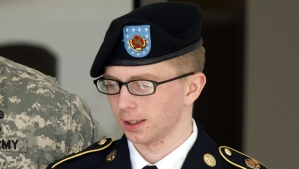The case of Bradley Manning matters.
The reason is simple: He touched a nerve.
Before releasing over 250,000 diplomatic cables to Wikileaks, Manning commented, “Hilary Clinton, and several thousand diplomats around the world are going to have a heart attack when they wake up one morning, and finds an entire depository of classified foreign policy is available, in searchable format to the public.”
According to Wikileaks, “The cables show the extent of US spying on its allies and the UN; turning a blind eye to corruption and human rights abuse in ‘client states’; backroom deals with supposedly neutral countries; lobbying for US corporations; and the measures US diplomats take to advance those who have access to them.”
Chase Madar has written a primer on the man and the case, The Passion of Bradley Manning: The Story of the Suspect behind the Largest Security Breach in U.S. History. One of the book’s chapters is entitled, “The Torture of Bradley Manning,” which examines the ways the government has tried to break Manning.
Manning had a clear intention in releasing these documents: U.S. citizens need to know what our government is doing around the world, and in our name. Manning trusted that his fellow Americans would pay attention to these documents, and grapple with their implications.
Having joined the Army to serve his country as an intelligence specialist in Iraq, Manning had his eyes opened to the evils produced by the U.S. occupation. He could not stomach the complicity of detaining loyal Iraqi dissidents who would most likely end up tortured. The injustices he saw began to undermine his confidence in why the U.S. was in Iraq.
Manning’s trial has been postponed to later this year or early next.
As I was reading through Madar’s book, two other Americans came to my mind.
While he was alive, Martin Luther King, Jr. was seen by members of the establishment as a Communist, the standard demonization smear during the Cold War. In his 1967 Beyond Vietnam speech, he stated, “We are at the moment when our lives must be placed on the line if our nation is to survive its own folly. Every man of humane convictions must decide on the protest that best suits his convictions, but we must all protest.”
One of King’s American precursors in raising critical questions about national policy was Henry David Thoreau. In his essay on civil disobedience, Thoreau wrote, “Let your life be a counter friction to stop the machine. What I have to do is to see, at any rate, that I do not lend myself to the wrong which I condemn.”
Manning decided on the protest he could make to assist the nation survive its war-making folly. In so doing, he has offered a personal counter friction to the U.S. business as usual.
For Barack Obama, the case against Manning is cut and dried: “He broke the law.”
As did Thoreau.
As did King.
Chase Madar offers us this challenge: “If the disclosures have failed to alter American statecraft, then the fault lies not with the whistleblower, but with a society incapable of receiving this great gift of knowledge.”
